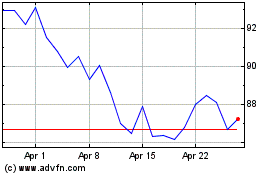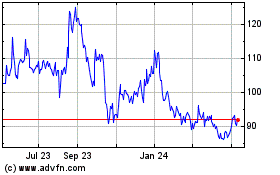Canada to Allow Covid-19 Vaccine Mixing
June 01 2021 - 1:44PM
Dow Jones News
By Paul Vieira
OTTAWA--Canadian health authorities said Tuesday authorized
Covid-19 vaccines are interchangeable, a decision partly motivated
by the risk of blood clotting associated with a dose of AstraZeneca
PLC's vaccine.
Letting people get a different vaccine for their second dose
could also help Canada maintain its accelerated pace of
inoculation, and reach its target of getting most of the population
fully vaccinated by the end of September.
Some Canadian provinces, most notably Ontario, put a halt on the
use of AstraZeneca's vaccine for a first dose due to the risk,
while other provinces stopped because of a lack of supply. Canada's
national advisory panel on immunization said messenger vaccines
produced by Pfizer Inc., in partnership with BioNTech SE, and
Moderna Inc. were preferred over viral vaccines, such as those from
AstraZeneca and Johnson & Johnson.
The panel said Tuesday that, after reviewing available evidence,
it was safe for people who received a first dose of AstraZeneca's
vaccine to receive an mRNA vaccine, as produced by Pfizer-BioNTech
and Moderna Inc., for their second shot. Some European countries,
such as Germany and France, already allow people to receive a
different vaccine for their second shot.
The panel added mRNA vaccines can also be mixed.
"It is expected that combining different Covid-19 vaccines that
induce an immune response against [the new coronavirus] will lead
to a robust immune response," the advisory panel said in its
recommendation on mixing vaccines. While its recommendations aren't
binding, they tend to be closely followed by the country's
provinces, which have responsibility for delivering health
care.
The panel said that because of AstraZeneca's safety profile and
risk of blood clotting, "offering an alternative product with a
more acceptable safety profile and expected comparable
immunogenicity profile, while enabling individuals to make an
informed choice, is ethically justifiable." The Public Health
Agency of Canada has estimated the rate of a blood clot linked to
the AstraZeneca vaccine in Canada to be one in 83,000 doses
administered.
Over the past two months, Canada has sharply increased the
administration of Covid-19 vaccines, with nearly 60% of the
population having received one dose versus 14% at the start of
April. However, Canada lags by a sizable margin the rest of the
developed world in terms of the share of the population that is
fully vaccinated, at 5%.
Over two-thirds of doses administered in Canada are from
Pfizer-BioNTech, and the country is expecting deliveries of more
than two million doses a week through June and July. Canadian
officials say they expect millions of Moderna and AstraZeneca doses
this month.
The panel said Canada is anticipating large supplies of mRNA
vaccines in the summer months "that will be sufficient to complete
the second dose in all age groups for whom immunization is
recommended." Canadian officials have set the end of September as
the date at which it is hoped the bulk of the population will be
fully vaccinated.
Write to Paul Vieira at paul.vieira@wsj.com
(END) Dow Jones Newswires
June 01, 2021 13:38 ET (17:38 GMT)
Copyright (c) 2021 Dow Jones & Company, Inc.
BioNTech (NASDAQ:BNTX)
Historical Stock Chart
From Mar 2024 to Apr 2024

BioNTech (NASDAQ:BNTX)
Historical Stock Chart
From Apr 2023 to Apr 2024
